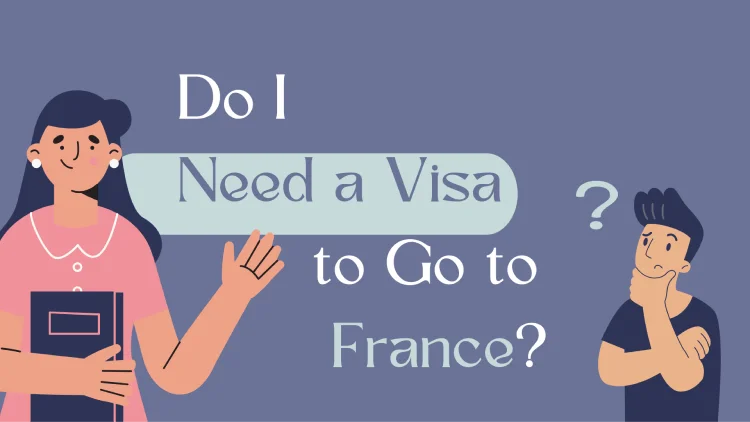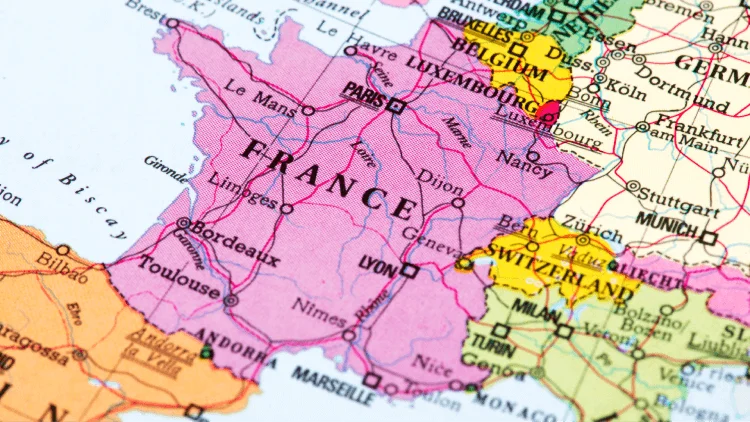When planning a trip to France, one important thing to be familiar with is the visa regulations, which can differ depending on which part of France you are going to.
Here’s a breakdown of the territories and their regulations:
By the way, getting an iRoamly France travel eSIM can help you stay on top of any visa updates and travel smoothly.

Do I Need a Visa to Visit France?
Know Your Destination: French Territories and Visa Regulations
Source: General Directorate of Foreign Nationals
French territory is legally split into three categories, and the different areas have different requirements, so visas need to be decided on the area you are visiting:
European territories: Part of the Schengen Area.
Overseas departments and regions: Includes Reunion, Martinique, Guadeloupe, French Guiana, and Mayotte.
Overseas collectivities and territories: Comprising Saint Pierre and Miquelon, French Polynesia, New Caledonia, Wallis and Futuna, French Southern and Antarctic Lands, Saint Martin, and Saint Barthelemy.

The European part of France is part of the Schengen Area, a zone including territories of other EU countries and certain associated states (such as nearby Iceland) with open borders for travel.
But it’s crucial to remember the Schengen Agreement only concerns EU countries, and only European territories of France. A Schengen visa will not allow entry to the overseas departments or territories – and vice versa.
If you intend to travel to the Schengen area and the overseas collectivities, you will need to arrange two separate visas to allow you to leave and return to the Schengen territory.
List of Countries That Do Not Require a Visa
The general rule is you do need a visa, unless an exception applies. As of 2024, passengers from 89 countries with ordinary passports are visa-exempt for short stays when visiting mainland France, with a permit issued on arrival.
Albania (90 days) | Iceland (Freedom of movement) | Palau (90 days) |
Andorra (90 days) | Ireland (Freedom of movement) | Panama (90 days) |
Antigua and Barbuda (3 months) | Israel (90 days) | Paraguay (90 days) |
Argentina (90 days) | Italy (Freedom of movement) | Peru (90 days) |
Australia (90 days) | Japan (90 days) | Poland (Freedom of movement) |
Austria (Freedom of movement) | Kiribati (90 days) | Portugal (Freedom of movement) |
Bahamas (3 months) | Latvia (Freedom of movement) | Romania (Freedom of movement) |
Barbados (3 months) | Liechtenstein (Freedom of movement) | Saint Kitts and Nevis (3 months) |
Belgium (Freedom of movement) | Lithuania (Freedom of movement) | Saint Lucia (90 days) |
Bosnia and Herzegovina (90 days) | Luxembourg (Freedom of movement) | Saint Vincent and the Grenadines (90 days) |
Brazil (3 months) | North Macedonia (90 days) | Samoa (90 days) |
Brunei (90 days) | Malaysia (90 days) | San Marino (90 days) |
Bulgaria (Freedom of movement) | Malta (Freedom of movement) | Serbia (90 days) |
Canada (90 days) | Marshall Islands (90 days) | Seychelles (3 months) |
Chile (90 days) | Mauritius (3 months) | Singapore (90 days) |
Colombia (90 days) | Mexico (90 days) | Slovakia (Freedom of movement) |
Costa Rica (90 days) | Micronesia (90 days) | Slovenia (Freedom of movement) |
Croatia (Freedom of movement) | Moldova (90 days) | Solomon Islands (90 days) |
Cyprus (Freedom of movement) | Monaco (90 days) | South Korea (90 days) |
Czech Republic (Freedom of movement) | Montenegro (90 days) | Spain (Freedom of movement) |
Denmark (Freedom of movement) | Netherlands (Freedom of movement) | Sweden (Freedom of movement) |
Dominica (90 days) | New Zealand (90 days) | Switzerland (Freedom of movement) |
East Timor (90 days) | Nicaragua (90 days) | Tonga (90 days) |
El Salvador (90 days) | Norway (Freedom of movement) | Trinidad and Tobago (90 days) |
Estonia (Freedom of movement) | Tuvalu (90 days) | |
Finland (Freedom of movement) | Ukraine (90 days) | |
France (Freedom of movement) | United Arab Emirates (90 days) | |
Georgia (90 days) | United Kingdom (Freedom of movement) | |
Germany (Freedom of movement) | United States (90 days) | |
Greece (Freedom of movement) | Uruguay (90 days) | |
Grenada (90 days) | Vanuatu (90 days) | |
Guatemala (90 days) | Venezuela (90 days) | |
Honduras (90 days) | ||
Hungary (Freedom of movement) |
How to Apply for a French Visa If You Are Not From a Visa-Free Country?
The detailed application process to apply for a French visa largely depends on your nationality, as well as the length and purpose of your visit. Here are the general steps to get started:
Step-by-Step Guide
Determine Visa Type: Decide if you need a short-stay or long-stay visa.
Gather Required Documents: This includes a valid passport, recent photos, and supporting paperwork that's relevant to your visit.
Submit Biometrics: Anyone over 12 must provide biometric data.
Book an Appointment: Visit a visa application centre prior to your intended trip.
Track Your Application and Collect Your Passport: Typically processed within 15 days, though in some cases this can extend to 45 days.

Relevant Websites
French visa official website: https://france-visas.gouv.fr/en/web/france-visas/home
French visa application official website guidance: https://www.diplomatie.gouv.fr/en/coming-to-france/requesting-a-visa/
French visa official website process: https://france-visas.gouv.fr/en/visa-application-guidelines
Additional Documents You May Need
Health Documentation: Depending on current health advice, this could involve having vaccinations or health insurance.
Proof of Accommodation: Booking of hotels or an invitation letter if staying with someone in France.
Proof of Financial Means: Whether from a personal bank account or a sponsor, proof you can support yourself while in France.
FAQ
Do I Need a Covid Test to Enter France?
At time of writing, this will depend on the current health advice. Check before travelling.
What Do I Need to Fly with Air France?
Passport, visa (if needed), boarding pass, and possibly health-related documents like vaccination certificates.
Do Australians Need a Visa for France?
Whether you need a visa for France from Australia depends on the purpose and duration of your stay. For example:
Short trips (Tourism or Business): Australians don’t need a visa for a stay of up to 90 days within any 180-day period for reasons of tourism or business.
Longer stays (Work, Study, Residency): If your plans for France entail a stay of greater than 90 days, though, you’ll be required to secure a French visa relevant to the purpose of your stay – be it a work visa, student visa, or long-term residency visa.
As ever, though, be sure to consult the French visa application website for your personal circumstances.
Summary
Visiting France is a wonderful experience, but one that requires preparation, especially when it comes to visas.
Be they you're visa exempt or need one to enter the country, being across these rules will ensure a smooth arrival in mainland France or any of its territories.
